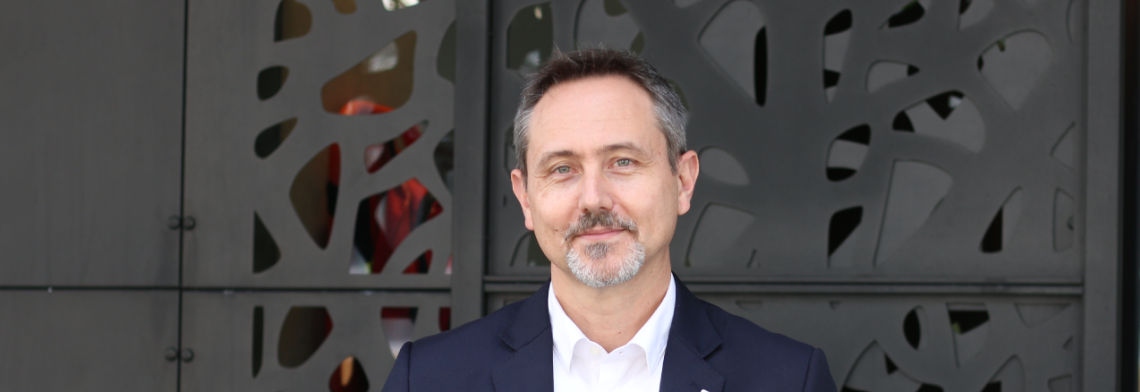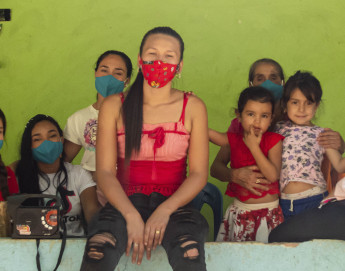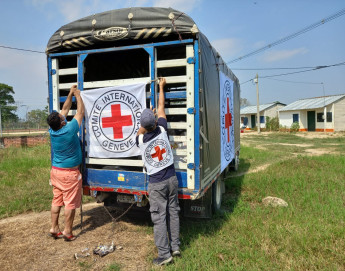
"Listening to the voices of victims": Lorenzo Caraffi

The country has made great strides, especially in terms of vaccinating its population against COVID-19. However, challenges remain both in achieving adequate vaccination coverage and in addressing the consequences of armed action in various parts of the country.
In 2021, teams from the International Committee of the Red Cross (ICRC) in Colombia gathered personal accounts from individuals and communities impacted by the six non-international armed conflicts occurring in the country right now. Their voices reflect the uncertainty and anguish in the face of a situation that reveals their undeniable resilience, but to which no human being should get used to.
Last year, I had the chance to meet some of the communities living in the Catatumbo mountains and Pacific forests and hear their stories firsthand. I was deeply moved to see the smiles on their faces, despite the pain of enduring the ravages of armed conflict. These people may live in vastly different landscapes, but they all share the same fears and the same hope of a life without fighting between armed actors.
The ICRC teams have seen with greater force the consequences of the various armed conflicts in Antioquia, Arauca, Bolívar, Cauca, Chocó, Nariño, Norte de Santander, Putumayo and Valle del Cauca, as well as in various regions of the Colombian southeast
The number of victims of explosive hazards has increased for the fourth consecutive year. Beyond the physical injuries caused by these hazards, the constant potential threat of explosion is taking an immense toll on the mental health of affected communities and making it difficult for them to access basic services and carry out their livelihoods. There has also been a rise in the number of communities who have been displaced or whose movement has been restricted owing to fear and armed groups' lack of compliance with international humanitarian law and other humanitarian standards.
Disregard for these norms continues to result in deaths, injuries and disappearances. This, in addition to other acts such as sexual violence, the association of children and adolescents with armed actors, the destruction of natural resources and civilian property, among others, makes the civilian population the first victim of the consequences of confrontations.
All weapon bearers must respect and ensure compliance with humanitarian standards
In 2021, there was additionally a regrettable record of attacks on health-care workers, facilities and vehicles, and citizens continued to be the main perpetrators. We likewise saw humanitarian assistance being hindered at times of greatest need.
I must make an emphatic appeal to armed groups and other weapon bearers, public institutions and citizens to respect the work of humanitarian organizations. Their presence in different parts of the country is fundamental to the survival of communities in these difficult circumstances. We at the ICRC are in no doubt as to our obligation to respond to the most pressing needs of people affected by armed conflict and violence, while continuing to uphold the principles of neutrality, impartiality and independence.
In this year of legislative and presidential elections in Colombia, we ask that those elected take into account the victims of armed conflict and violence when setting their political agendas.
These people's voices must be heard to understand the problems they face and find pragmatic solutions to help alleviate their suffering and enable them to live with dignity.
The mountains, forests and rivers of this country must also be taken into consideration and shielded from the effects of armed conflict and violence.
Regardless of who wins the elections, I would like to reaffirm our commitment to carrying out humanitarian work in Colombia – a commitment that now spans over 50 years. We shall remain firm in fulfilling our global responsibility to reach those areas most affected by various types of violence. Our almost 500 strong team of humanitarian workers, hand in hand with our colleagues at the Colombian Red Cross, will continue to do everything they can to meet the humanitarian needs arising in this country.
Lorenzo Caraffi
Head of ICRC Delegation in Colombia



